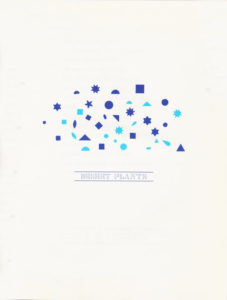
„Desert Plants“ was a cult book in the seventies because it brought the first information about the US-American composer-performer scene to Europe. Numerous examples of sheet music and entire scores enrich this insight into a time of experimentation that needs to be brought back into consciousness.
The book, which has been reprinted unchanged, is dedicated to Carol Byl, who at the time transcribed the tapes largely literally in order to maintain the „stream of consciousness“. The cover picture was drawn by Michael von Biel.
The edition is accompanied by a CD which makes the surviving sound documents available in restored form as mp3 files, including the famous telephone conversation with La Monte Young. Thus the original voices from 1975 can be heard – a contemporary document.
Walter Zimmermann’s interview partners are Morton Feldman, Christian Wolff, John Cage, Philip Corner, Jim Burton, Phil Glass, Steve Reich, Robert Ashley, Alvin Lucier, Joan La Barbara, Pauline Oliveros, David Rosenboom, Richard Teitelbaum, Larry Austin, James Tenney, J. B. Floyd (about Conlon Nancarrow), La Monte Young, Charlemagne Palestine, Charles Morrow, Garrett List, John Mc Guire and Ben Johnston (about Harry Partch).
The book can be ordered here:
https://musiktexte.de/…
„Desert Plants“ war in den Siebzigerjahren ein Kultbuch, weil es die ersten Informationen über die US-amerikanische Composer-Performer-Szene nach Europa brachte. Zahlreiche Notenbeispiele und ganze Partituren bereichern diesen Einblick in eine Zeit des Experimentierens, die es nun gilt, wieder ins Bewusstsein zu holen.
Das unverändert nachgedruckte Buch ist Carol Byl gewidmet, die damals die Tonbänder weitgehend wörtlich transkribiert hat, um den „stream of consciousness“ beizubehalten. Das Titelbild hat Michael von Biel gezeichnet.
Der Ausgabe liegt eine CD bei, die alle erhaltenen Tondokumente in restaurierter Form als mp3-Dateien zugänglich macht, darunter auch das berühmt gewordene Telefonat mit La Monte Young. So sind die Originalstimmen aus dem Jahre 1975 zu hören – ein Zeitdokument.
Gesprächspartner von Walter Zimmermann sind Morton Feldman, Christian Wolff, John Cage, Philip Corner, Jim Burton, Phil Glass, Steve Reich, Robert Ashley, Alvin Lucier, Joan La Barbara, Pauline Oliveros, David Rosenboom, Richard Teitelbaum, Larry Austin, James Tenney, J. B. Floyd (über Conlon Nancarrow), La Monte Young, Charlemagne Palestine, Charles Morrow, Garrett List, John Mc Guire und Ben Johnston (über Harry Partch).
Bestellung ab sofort hier möglich:
https://musiktexte.de/…
23 Sentences from DESERT PLANTS
MORTON FELDMAN: Something that is beautiful is made in isolation.
CHRISTIAN WOLFF: I try wherever possible to discourage competitive sort of careerism.
JOHN CAGE: So that it takes an old fogey like myself to suggest again as Thoreau did all of his life, revolution.
PHILIP CORNER: A lot of people hang up to restrictions which are not only in the external institutions. They are in your own mind.
PHIL GLASS: The quintessence of harmonic music is in cadence for me.
STEVE REICH: You must love music or be a duck.
ROBERT ASHLEY: If you record a conversation with fifty people in the United States about their ideas, and if you get into each conversation really deeply, that when you get to the end, you will have one of me, one of Steve Reich, but you will have fifty of yourself.
ALVIN LUCIER: But when you stutter, you scan the language. You are scanning your past.
JOAN LA BARBARA: You know, instead of trying to direct the voice, I try to let the voice direct me.
PAULINE OLIVEROS: I’m aware of my own physiology. And then I’m hearing it as a whole, and I’m aware of the various rates that are going on, the kinds of breaks in concentration that occur and how they are corrected.
DAVID ROSENBOOM: What I’m looking at really is the existence of regularly pulsing energy.
RICHARD TEITELBAUM: I played the same synthesizer for ten years. Me and it are very close to each other.
LARRY AUSTIN: Ives’ main thing, I feel, was the concept of layering and getting us out of the idea that the sounds always had to come from the same place; that is, right in front of you.
JAMES TENNEY: I realized in writing these pieces that this was one way to avoid drama, which I’m still trying to find ways to avoid.
J. B. FLOYD about NANCARROW: Somebody actually brought up what was going to happen to the piano roles after he died; and he said, “Why? Do you want one?”
LA MONTE YOUNG: You can always say that you wanted La Monte Young, but it was impossible. He was so mercenary, he wanted money.
CHARLEMAGNE PALESTINE: I’m searching for sort of this golden sonority.
CHARLES MORROW: The high art itself is a form of power consciousness, that in a way one listens to the high art in the same way that one walks around being a flirt.
GARRETT LIST: The only way for a one-world kind of feeling is where each nationality, each locality, has its own strength; so that people don’t need to have to take from another place.
FREDERIC RZEWSKI: It’s still true that most Americans care more about the price of meat than they do about the exploitation of Bolivian miners.
JOHN MC GUIRE: But sooner or later I am sure that I will return to America.
BEN JOHNSTON about HARRY PARTCH: He was really willing to be as direct and as simple and as corny as you like, as people are when they aren’t trying to be concert Artists.